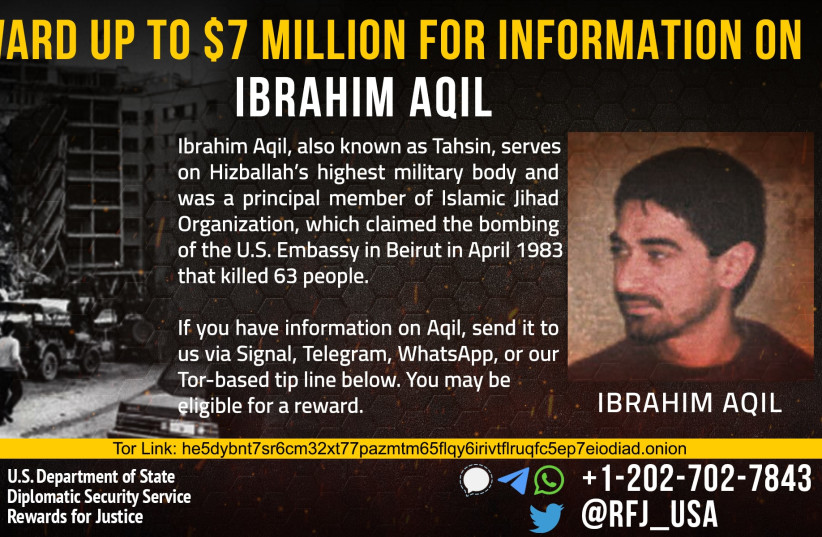Over the weekend, KAN News identified the man responsible for Hezbollah’s elite Radwan Force – Ibrahim Aqil, a Hezbollah terrorist who has been sanctioned in the past by the US.
The report noted that the Radwan Force includes many of Hezbollah’s elite fighters, and has suffered casualties in the last 60 days of tension with Israel in the North. More than 100 Hezbollah fighters have been wounded or killed since October 7, when the Lebanese-based terrorist group began to launch rockets, drones, and mortars at the Jewish state to support Hamas.
The report said that Aqil is “also the one who is largely responsible over the last two years for the movement of Radwan personnel toward Israel’s northern border.” The report noted that under Aqil’s leadership, the elite force has seen several operational failures.
“Dozens of failed launches of anti-tank missiles have led to casualties and damages to property on the Lebanese side,” it said, adding that “following the [pause in fighting on November 24], the presence of the Radwan Force in the border area has decreased, compared to the period before October 8, when Hezbollah joined the fighting… Since the firing was renewed yesterday in the North, Aqil continues to conduct his war effort, despite the many failures and deaths in the first round.”
Hezbollah has failed but real threats persist
The main gist of this discussion is to highlight the fact that this known Hezbollah terrorist has failed. Nevertheless, the Radwan Force, and Hezbollah in general, remain a major threat.

Alma’s Research and Education Center noted last week that “Hezbollah’s Radwan unit is capable of invading the Galilee at any given moment.”
That report noted that Hezbollah has had to shift some of its posture in the wake of October 7. “Even if most of the Radwan operatives have distanced themselves from the border since the beginning of the war, in our assessment, this does not neutralize their ability to fulfill their main objective. We assess that the Radwan unit is continuing to collect intelligence near the border, and is making adjustments to its operational plans.”
It further stated that “as of this writing, around 90 Hezbollah operatives have been killed since October 7. It seems that some of those killed were operatives and commanders in the Radwan unit. The number of operatives killed has no bearing on Hezbollah’s overall competence or that of the Radwan unit in particular.”
Aqil is a central figure in Hezbollah, having played a role in the terrorist group’s involvement in the Syrian civil war after 2011, according to a July 2021 article by Matthew Levitt at the Washington Institute.
Also, Aqil was a member of the group’s “Jihad Council,” and was sanctioned by the US, which offered a reward to the tune of up to $7 million as of this past April. The reward noted that Aqil, “also known as Tahsin, serves on Hezbollah’s highest military body, the Jihad Council.”
Back in the 1980’s, Aqil was a principal member of the Islamic Jihad – Hezbollah’s terrorist cell – that claimed the bombings of both the US Embassy in Beirut in April 1983, which killed 63 people, and the US Marine barracks a few months later in October, which killed 241 US personnel.
The report further highlighted that the US Department of the Treasury associated Aqil to a hostage-taking situation on July 21, 2015, and that he was added to the list of Specially Designated Global Terrorists in 2019.
The overall trajectory of Aqil and his role in Israel’s current tensions with Hezbollah remains unclear. Whether Hezbollah has failed in Lebanon and this failure has led to losses for the group, or whether the group sees this as a success, will take time to determine. Because, since it has a lot of military hardware and numerous fighters, Hezbollah continues to pose for a threatening presence, despite having suffered losses.
